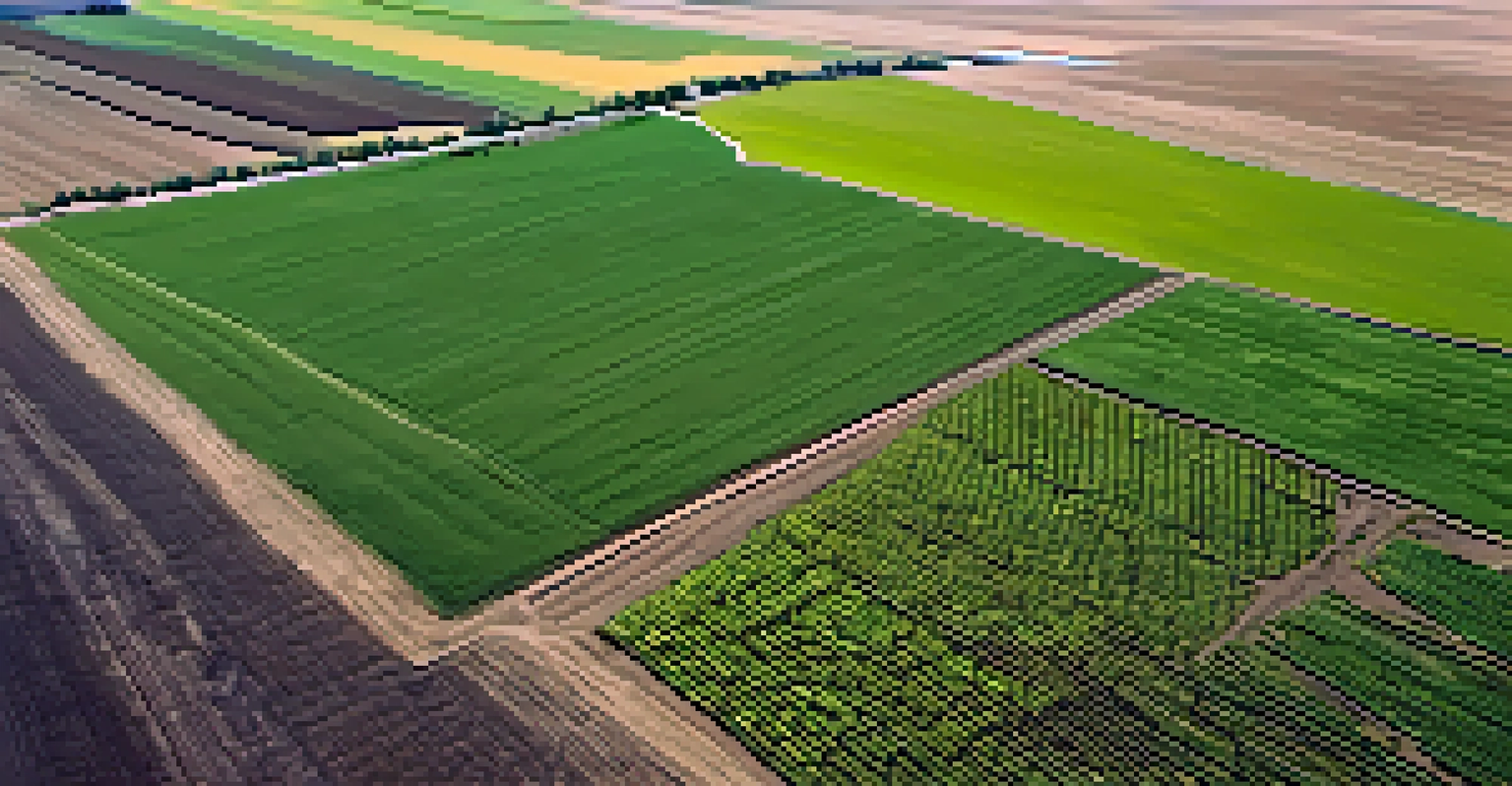Adapting to Colorado's Climate: Strategies for Farmers

Understanding Colorado's Unique Climate Challenges
Colorado's climate is a mix of high altitude, arid conditions, and unpredictable weather patterns, presenting unique challenges for farmers. With variations in temperature and precipitation, crops can face stress during critical growing periods. Understanding these factors is essential for effective planning and management.
The best time to plant a tree was twenty years ago. The second best time is now.
Farmers must navigate the short growing season, which can limit the types of crops that can be successfully cultivated. Additionally, sudden hailstorms and extreme temperature shifts can wreak havoc on crops, making adaptive strategies vital. By being aware of these challenges, farmers can take proactive measures to protect their livelihoods.
Ultimately, awareness of Colorado's climate intricacies can empower farmers to make informed decisions about crop selection and management practices. This knowledge serves as the foundation for developing resilience against the inherent unpredictability of the environment.
Selecting Drought-Resistant Crops for Sustainability
Drought-resistant crops are a game changer for Colorado farmers, allowing for more sustainable farming practices in arid conditions. Varieties such as sorghum, millet, and certain legumes require less water and can thrive in dry soil, making them ideal choices for the state’s climate. By incorporating these crops, farmers can reduce their reliance on irrigation.

Not only do drought-resistant crops help conserve water, but they also contribute to soil health. These plants often have deep root systems that improve soil structure and prevent erosion, especially during dry spells. Plus, they can enhance biodiversity on farms, creating healthier ecosystems.
Adapt to Colorado's Climate Challenges
Farmers must understand Colorado's unique climate to effectively plan and manage their crops.
Transitioning to these crops may require some education and experimentation, but the long-term benefits are substantial. Farmers willing to adapt their crop selections can increase resilience against drought and ensure a more sustainable future for their operations.
Implementing Efficient Irrigation Systems
Colorado's limited water resources make efficient irrigation a necessity for farmers looking to thrive. Modern systems like drip irrigation can deliver water directly to the plant’s roots, minimizing waste and maximizing efficiency. This method not only conserves water but also encourages healthier plant growth.
In the middle of every difficulty lies opportunity.
Farmers can also benefit from scheduling irrigation based on weather patterns, using tools like soil moisture sensors to determine the optimal times to water. This approach reduces water use and ensures that crops receive just the right amount of moisture. By being mindful of irrigation techniques, farmers can significantly lower costs and improve yields.
Investing in efficient irrigation systems can be a game changer, allowing farmers to adapt to Colorado's unique climate while promoting sustainable practices. As water scarcity becomes an increasingly pressing issue, these strategies will help safeguard both crops and the environment.
Utilizing Cover Crops for Soil Health
Cover crops are a fantastic tool for Colorado farmers aiming to improve soil health and combat erosion. By planting crops like clover or rye during the off-season, farmers can protect their soil from harsh winter conditions and wind erosion. These crops add organic matter to the soil, enhancing its fertility and structure.
In addition to soil benefits, cover crops can help suppress weeds and reduce the need for chemical herbicides. This practice promotes a healthier ecosystem while also supporting sustainable farming methods. By improving soil quality, farmers can ultimately see increased yields in their main crops.
Drought-Resistant Crops for Sustainability
Incorporating drought-resistant crops can enhance sustainability and reduce the need for irrigation.
Integrating cover crops into farming systems may require some adjustments, but the rewards are well worth the effort. Healthy soil leads to healthier plants, making cover crops a valuable strategy in adapting to Colorado's challenging climate.
Embracing Technology for Climate Adaptation
Advancements in technology offer Colorado farmers innovative ways to adapt to climate challenges. Precision agriculture tools, such as drones and satellite imaging, enable farmers to monitor crop health and soil conditions from the sky. This data-driven approach allows for timely interventions and optimizes resource use.
Farmers can also leverage weather forecasting apps to stay informed about imminent weather changes, helping them make crucial decisions about irrigation and planting schedules. By harnessing these technologies, farmers can be more proactive in managing their operations and mitigating risks associated with climate variability.
Ultimately, embracing technology not only enhances efficiency but also supports sustainable practices in agriculture. As the climate continues to change, these tools will be essential in helping farmers navigate the complexities of farming in Colorado.
Creating a Comprehensive Farm Management Plan
A comprehensive farm management plan is essential for Colorado farmers aiming to adapt to climate challenges effectively. This plan should outline strategies for crop selection, irrigation methods, and soil management practices. By having a clear roadmap, farmers can respond swiftly to changing conditions and make informed decisions.
Incorporating elements such as budgeting for potential losses and planning for crop rotation can further strengthen a farm’s resilience. Engaging with local agricultural experts and extension services can provide valuable insights and resources to enhance these plans. Collaboration often leads to innovative solutions tailored to unique farm conditions.
Community Support is Essential
Building a strong community network enables farmers to share knowledge and resources to tackle climate challenges together.
By establishing a thorough management plan, farmers not only prepare for climate variability but also position themselves for long-term success. This proactive approach can foster adaptability and ensure the sustainability of farming practices in Colorado.
Building Community Support and Collaboration
Building a strong community network is vital for farmers facing Colorado's climate challenges. By collaborating with local agricultural organizations and participating in forums, farmers can share experiences and learn from each other’s successes and failures. This collective knowledge often leads to innovative solutions for shared problems.
Networking also opens doors to resources such as grants, workshops, and training opportunities that can help farmers adapt their practices. Local agricultural events and cooperative programs foster a sense of community, empowering farmers to tackle climate challenges together. Support from peers can be a significant motivator for experimentation and adaptation.

Ultimately, a united farming community can drive positive change in agricultural practices across Colorado. By leaning on each other for support and knowledge, farmers can enhance their resilience and thrive despite the challenges posed by the climate.
Advocating for Sustainable Agricultural Policies
Advocacy for sustainable agricultural policies is crucial for Colorado farmers facing climate challenges. Engaging with local government and agricultural boards can help ensure that farmers' needs and experiences are represented in policy discussions. Supporting policies focused on sustainable practices can create a more favorable environment for adaptation.
Farmers can also benefit from participating in initiatives that promote conservation and resource management. By advocating for funding and support for sustainable practices, farmers contribute to a collective effort that benefits the entire agricultural community. This engagement can lead to more resources and tools for adapting to climate changes.
By working together to influence policy, farmers can create a more sustainable and resilient agricultural landscape in Colorado. Advocacy is not just about protecting individual interests; it’s about fostering a future where farming can thrive amid changing climatic conditions.